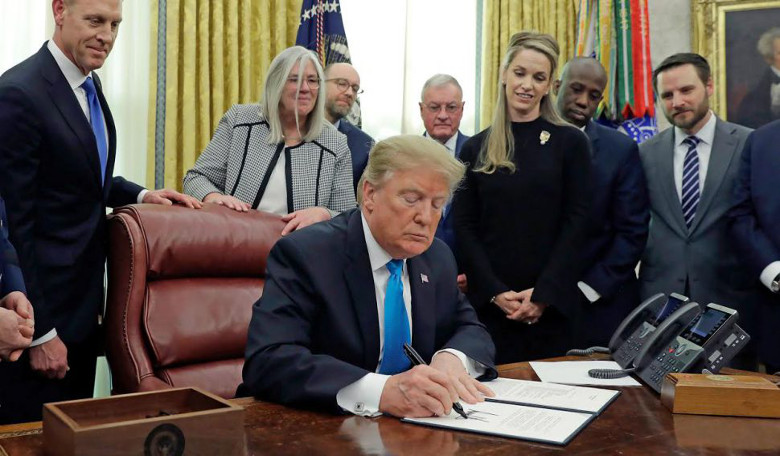After what appeared to be an off-the-cuff remark about creating a Space Force last year, Donald Trump's plans to create a separate military division to protect America's interests in orbit took one step closer to becoming reality yesterday, with the signing of the President's fourth space policy directive.
Space Policy Directive-4 calls on the Secretary of Defence to develop a legislative proposal that paves the way forward for the creation of Trump’s Space Force. Initially touted to be its own independent department, the division will instead become a sixth branch of the US Air Force; an arrangement that will be periodically assessed to see whether a separate department is needed or not.
“The United States is the best in space, and our adversaries know it,” says a statement by President Trump via the Whitehouse website. “Our destiny, beyond the Earth, is not only a matter of national identity, but a matter of national security.”
The main goal of the Space Force is to secure and extend American dominance of the space domain, and if it gets the full cooperation of congress – which it has yet to do – then President Trump has a steadfast vision for what the Space Force do. This includes; strengthen America’s ability to compete, deter and win in an increasingly contested domain; organise, train and equip our space war fighters with next-generation capabilities and maximise war fighting capability and advocacy for space while minimising bureaucracy.
However, not everyone shares the President’s enthusiasm for the creation of a new soldiers in space division. Speaking about the directive, Dr. Laura Grego, a senior scientist in the Union of Concerned Scientists Global Security Program and an expert in satellites and space weapons said: “President Trump has called space a new war fighting domain. Space is important to militaries, that’s true, but it is only a small piece of what happens up there.
“Eighty percent of the nearly 2,000 satellites are civilian, providing critical communications and economic services for humanity’s well-being. We need to take care of space. If concentrating authority in a space force creates an incentive for nations to build space weapons that increase the likelihood of conflict, it would be a profoundly bad idea.
“There are much better ways to protect satellites. Space security cannot be achieved unilaterally or solely through military means. It will require coordination and cooperation with other spacefaring nations. That means diplomacy.”
Although establishing a new military branch ultimately requires legislation from Congress, if the Space Force was created as part of the Air Force – similar to how the Marine Corps is seen as a distinct unit but is fundamentally part of the US Navy – then it could be a way to placate the lawmakers who have previously opposed its creation as a separate branch.
And with an infrastructure already in place, it is reasonable to assume that many overheads associated with creating a new military branch would be mitigated.
Nonetheless, details of any funding, should Congress decide to act on the directive positively, are likely to be released mid-March when details of the president’s yearly budget proposal are revealed.











